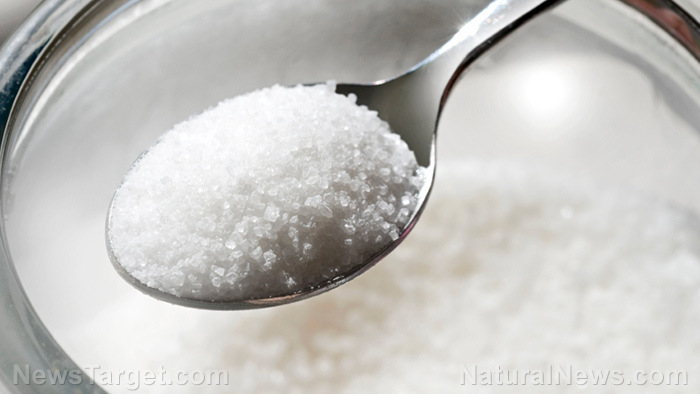High blood pressure is caused more by sugar consumption than salt intake
05/08/2018 / By Jessica Dolores

Even scientists can bark up the wrong tree sometimes. For more than a century, they have pointed their fingers at salt as the main culprit in high blood pressure or hypertension that leads to kidney damage, stroke, and heart attack. Some have even described salt as “the single deadliest ingredient in your pantry.” And many doctors insist on eliminating salt entirely from one’s diet to reduce the number of cases of hypertension and save lives.
But turns out salt is not the real villain. In fact, limiting salt in the diet can raise your chances of developing a fatal heart problem, especially if the salt comes from a healthy source.
Researchers from Saint Luke’s Mid America Heart Institute in Kansas City and Montefiore Medical Center in New York believe the benefits of doing away with sodium is “debatable” since the relationship between salt and heart disease is murky. A meta-analysis by the non-profit Cochrane Collaboration revealed that moderate amounts of salt can’t lower the risk of dying from or developing cardiovascular disease.
The real culprit where hypertension is concerned is sugar, especially fructose or table sugar. This is the result of a compelling research published in the BMJ journal OpenHeart. The researchers discovered that getting 25 percent of your calories from sugar can triple the risk of dying from cardiovascular disease. Those who get 10 percent of their calories from sugar, on the other hand, don’t have the said problem.
The study authors also stressed that most dietary salt is derived from processed foods, which are also the biggest source of additional sugar. The researchers cited population studies and clinical trials that showed sugar has an effect on blood pressure. In particular, researchers point to fructose, which many studies point to as the reason for a damaged cardiovascular system. The research team explained that fructose can increase blood pressure significantly. Taking in over 74 grams of fructose a day leads to a 77 percent chance of getting blood pressure above 160/100 mm Hg. (Related: Sugar sweetened drinks increase heart disease and diabetes risk in women.)
Mother Nature's micronutrient secret: Organic Broccoli Sprout Capsules now available, delivering 280mg of high-density nutrition, including the extraordinary "sulforaphane" and "glucosinolate" nutrients found only in cruciferous healing foods. Every lot laboratory tested. See availability here.
Natural sugar in fruits and vegetables can do no harm. This means that you may add moderate amounts of natural sweeteners like honey, and maple syrup in your food if you want to improve its taste, without running the risk of developing cardiovascular disease.
Sadly, the consumption of sugar has grown by leaps and bounds.
Around 30o years ago, the average person took only a few pounds of sugar a year. When processed foods and high fructose corn syrup in sodas entered the picture, the average sugar consumption shot up to a whopping 77 to 152 pounds a year. That’s equivalent to around 24 to 47 teaspoons of sugar a day or around 83 grams of fructose. Today, around 13 percent of Americans get at least 25 percent of their total calories as added sugars.
Here are healthier, safer alternatives to processed sugar:
- Coconut sugar – This is packed with antioxidants and other nutrients. Coconut itself is considered a miracle food. Coconut sugar goes well with tea and coffee.
- Date sugar – This comes from dried dates turned into powder. Date sugar doesn’t melt, so it’s ideal for baking.
- Maple syrup – Its manganese and zinc contents help increase energy production and boost the immune system. Try substituting processed sugar with maple syrup for healthier results.
- Raw honey – Its natural ingredients fight bacteria, and strengthen the immune system. Raw honey is packed with antioxidants. It stabilizes blood pressure and aids in balancing blood sugar levels. Try adding some in tea to help treat a sore throat, or drizzle it on your oatmeal for a healthy breakfast.
You can’t eliminate sugar from your meals entirely. Food will taste bland if you do. But you can have safer alternatives that will make you enjoy mealtimes without ruining your health.
Sources include:
Tagged Under: added sugars, bad nutrition, baddiets, blood pressure, cardiovascular disease, dietary salt, excess sugar, fructose, heart attack, heart health, heart problem, high blood pressure, hypertension, poor nutrition, preventable diseases, processed sugar, salt intake, sodium, sugar consumption, sugar intake




















